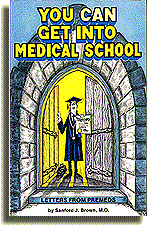![]()
![]()
![]()
![]()

YOU CAN GET INTO MEDICAL SCHOOL by Sanford J. Brown M.D.
![]()
FOREWORD Why does it seem so hard to get into medical school? Why do so many people seem to want to do it? Who gets accepted, and why? Perhaps more to the point, why are people not admitted? These and related questions are what this book is all about.
Actually only a very small percentage of college students and alumni apply to medical school each year. Currently, about 950,000 people are awarded a bachelor's degree annually, but only 45,000 apply to medical school, of whom 25% have been out of college a year or more. Thus, only about 3% of college graduates apply yearly-not so many people.
The difficulty, of course, is that there are only 16,000 freshman-class places available each year. When the application season ends and medical school begins only half of the applicants that year have been admitted.
What does it take to get in? Medical schools favor applicants with high grade-point averages from college, high scores on the Medical College Admission Test, As and Bs in the few required premedical sciences, some knowledge of current health-care delivery, good recommendations from former professors, coherent reasons for wanting to become a physician, and the ability to carry on an intelligent conversation for at least 15 minutes. Successful applicants need not have attended prestigious colleges or graduate schools, or even necessarily earned the bachelor's degree! They need not have any money, friends or relatives in medicine, or definite career plans beyond medical school. The common denominator of accepted applicants seems to be high achievement, expressed in any way the applicant chooses. These days medical schools routinely enroll people in their thirties from other professions, such as dentists, lawyers, nurses, ministers and athletes. Besides being high achievers these successful applicants have shown high ability in science education and are predictably successful as medical students. What medical schools do not want are students who they feel might fail out.
Why do people want to become physicians? I have asked this question of more than a thousand medical school applicants over the past 13 years.The answer seems to be quite simple: it's a great job. United States physicians in 1985 enjoy autonomy and control in their workplace, relatively high income, absolute job security, community prestige and societal respect. They have continuous opportunities to learn, multiple opportunities for career shifts without "starting over," and can choose employment situations more freely than others. Most important, they work directly with and for people. Not because of any one of these but because of their special combination do intelligent, ambitious and compassionate people choose medicine as a career. I'm glad they do, for we need them.
For many the path to medical school is smooth. For others it is frustratingly slow and filled with obstacles; these are the aspiring physicians who write to Dr. Sandy Brown, some out of desperation. For the most part they have had little encouragement or specific, helpful advice about how to reach their goal. Their questions come in varying degrees of sophistication and from different perspectives; no two are exactly alike, just as no two applicants are exactly alike.
Dr. Brown, the Ann Landers of the premedical world, goes public in this book with his correspondents' deepest fears, greatest wishes, sincerest expressions. Many different aspects of premedical preparation are discussed (and questions answered)-there is something in this book for nearly every medical school applicant, successful or unsuccessful. Dr. Brown does a great service to premedical students and premedical advisors all over the country, for his advice and answers are compassionate, helpful, instructive and truly tell it like it is. We are fortunate that he has, once again, directed his attention to the premedical/medical interface, and entered our world.
Thomas L. Pearce, Ph.D.
Associate Professor and Assistant Dean Premedical and Health Professions Advisor College of Arts and Sciences University of Virginia Charlottesville, VA
![]()
HealthTrends
S. O. S.
Premed Advisory
Books & Pubs
WWW
Design
Home

